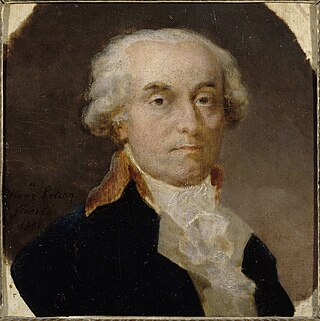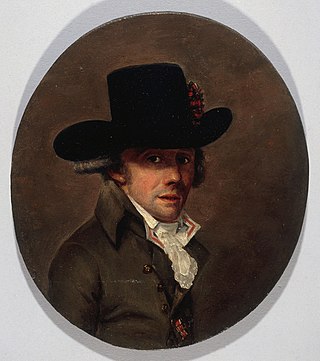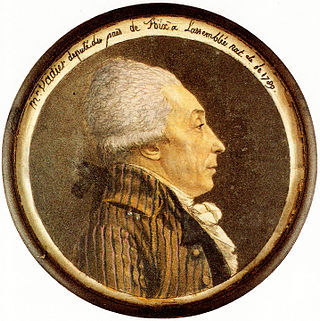Related Research Articles

The Girondins, or Girondists, were a political group during the French Revolution. From 1791 to 1793, the Girondins were active in the Legislative Assembly and the National Convention. Together with the Montagnards, they initially were part of the Jacobin movement. They campaigned for the end of the monarchy, but then resisted the spiraling momentum of the Revolution, which caused a conflict with the more radical Montagnards. They dominated the movement until their fall in the insurrection of 31 May – 2 June 1793, which resulted in the domination of the Montagnards and the purge and eventual mass execution of the Girondins. This event is considered to mark the beginning of the Reign of Terror.

Jérôme Pétion de Villeneuve was a French writer and politician who served as the second mayor of Paris, from 1791 to 1792, and the first regular president of the National Convention in 1792. During the French Revolution, he was associated with the moderate Girondins, and voted against the immediate execution of Louis XVI at the king's trial in January 1793, though he supported a suspended sentence. This led to Pétion's proscription by the Convention alongside other Girondin deputies following the radical insurrection of 31 May – 2 June 1793, and ultimately his suicide together with fellow-Girondin François Buzot while evading arrest during the Terror.

François Nicolas Léonard Buzot was a French politician and leader of the French Revolution.

Dominique Joseph Garat was a French Basque writer, lawyer, journalist, philosopher and politician.

Pierre Claude François Daunou was a French statesman of the French Revolution and Empire. An author and historian, he served as the nation's archivist under both the Empire and the Restoration, contributed a volume to the Histoire littéraire de la France, and published more than twenty volumes of lectures he delivered when he held the chair of history and ethics at the Collège de France.

Jean-Lambert Tallien was a French politician of the revolutionary period. Though initially an active agent of the Reign of Terror, he eventually clashed with its leader, Maximilien Robespierre, and is best known as one of the key figures of the Thermidorian Reaction that led to the fall of Robespierre and the end of the Terror.

François-Antoine, Count of the Empire (1756–1826) was a French writer, lawyer and politician during the Revolution and the Empire.

Jean-Baptiste Robert Lindet was a French politician of the Revolutionary period. His brother, Robert Thomas Lindet, became a constitutional bishop and member of the National Convention. Although his role may not have been spectacular, Jean-Baptiste Lindet came to be the embodiment of the growing middle class that came to dominate French politics during the Revolution.

François Louis Bourdon, also known as Bourdon de l'Oise, was a French politician of the Revolutionary period and procureur at the parlement of Paris.

Marguerite-Élie Guadet was a French political figure of the Revolutionary period.

Maximin Isnard, French revolutionary, was a dealer in perfumery at Draguignan when he was elected deputy for the département of the Var to the Legislative Assembly, where he joined the Girondists.

Jean Denis, comte Lanjuinais, was a French politician, lawyer, jurist, journalist, and historian.

Louis Legendre was a French politician of the Revolution period.
The Plain, better known as The Marsh, was the majority of independent deputies in the French National Convention during the French Revolution. They sat between the Girondists on their right and Montagnards on their left. Their name arises from the fact their benches were by the debating floor, lower down from the Montagnards. Its members were also known as Maraisards, or derogatorily Toads as toads live in marshes.

Louis Gustave le Doulcet, comte de Pontécoulant was a French politician. He was the father of Louis Adolphe le Doulcet and Philippe Gustave le Doulcet.

Marc-Guillaume Alexis Vadier was a major French politician of the French Revolution. He is sometimes called the "Great Inquisitor", for his active participation in the Reign of Terror. During this time, he was in charge of the Comité de Sûreté Générale, which was tasked with the prosecution of the so-called enemies of the Revolution. He is probably one of the main actors in the fall of Robespierre, who was his political rival.

Claude-Emmanuel Joseph Pierre, Marquess of Pastoret was a French lawyer, author and politician.

Vincent-Marie Viénot de Vaublanc, 1st baron Viénot de Vaublanc and of the Empire as known as "count de Vaublanc" ' was a French royalist politician, writer and artist. He was a deputy for the Seine-et-Marne département in the French Legislative Assembly, served as President of the same body, and from 26 September 1815 to 7 May 1816, he was the French Minister of the Interior.
Jean-Baptiste Mailhe was a politician during the French Revolution. He gave his name to the Mailhe amendment, which sought to delay the execution of Louis XVI.

Pierre-Louis Tribert was a French politician. He was one of 116 permanent senators of the French Third Republic.
References
- This article incorporates text from a publication now in the public domain : Chisholm, Hugh, ed. (1911). "Lecointe-Puyraveau, Michel Mathieu". Encyclopædia Britannica . Vol. 16 (11th ed.). Cambridge University Press. p. 355.